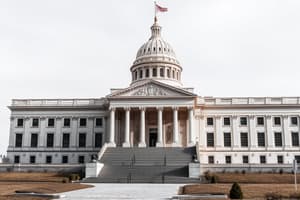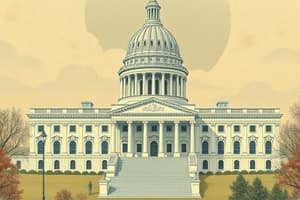Podcast
Questions and Answers
Which of these actions is forbidden by the Constitution?
Which of these actions is forbidden by the Constitution?
- Regulating trade with foreign countries
- Passing 'necessary and proper' laws
- Borrowing money from the government
- Creating a law ex post facto (correct)
Which of these steps is second in the bill process?
Which of these steps is second in the bill process?
- The bill is sent to the president.
- The president signs or vetoes the bill.
- The bill is introduced in Congress.
- The bill passes in both houses. (correct)
What can happen if the president chooses to veto a law that has been passed?
What can happen if the president chooses to veto a law that has been passed?
- The law returns to being introduced in one of the houses.
- The law is rejected and cannot be reconsidered.
- The president's decision is scheduled for review within a year.
- The president's decision can be overridden by a majority of Congress. (correct)
Which statement about Congress is accurate?
Which statement about Congress is accurate?
Congress has the express financial power to:
Congress has the express financial power to:
Which of these is an expressed power of Congress?
Which of these is an expressed power of Congress?
Which of these is considered a power of governance?
Which of these is considered a power of governance?
Article I, Section 8 of the Constitution describes what kind of congressional powers?
Article I, Section 8 of the Constitution describes what kind of congressional powers?
Why is the Necessary and Proper Clause a source of ongoing debate?
Why is the Necessary and Proper Clause a source of ongoing debate?
Which of these steps might happen after a bill is sent to the president?
Which of these steps might happen after a bill is sent to the president?
Flashcards are hidden until you start studying
Study Notes
Forbidden Actions by the Constitution
- Creating a law ex post facto is prohibited.
- Other actions like borrowing money or regulating trade are allowed.
Bill Process Steps
- The second step in the bill process is when the bill passes in both houses of Congress.
- The introduction of the bill occurs first, followed by the president signing or vetoing it.
Presidential Veto Consequences
- If the president vetoes a law, Congress can override the veto with a majority vote.
- The law does not return to the introduction stage; it is considered rejected unless overridden.
Structure of Congress
- Congress consists of two houses: the House of Representatives and the Senate.
- The Senate is not population-driven; both houses function within a bicameral legislature system.
Express Financial Powers of Congress
- Congress has the explicit power to create and collect new taxes.
- It does not have the authority to arbitrarily order the president to borrow money.
Expressed Powers of Congress
- Creating a national banking system is defined as an expressed power of Congress.
- Other options like admitting new states are not classified as expressed powers.
Powers of Governance
- Regulating trade between states is considered a power of governance.
- Other powers include maintaining armed forces and declaring war.
Congressional Powers in the Constitution
- Article I, Section 8 of the Constitution outlines expressed powers granted to Congress.
- These powers are also referred to as necessary powers for the operation of government.
Ongoing Debate on the Necessary and Proper Clause
- The Necessary and Proper Clause generates debate due to its ambiguous language.
- Congress often struggles to agree on the interpretation of this clause.
Actions After a Bill is Sent to the President
- The president has the option to veto the bill after it is sent.
- Alternatives, such as sending it back to committee or to another house, are not standard steps following transmission to the president.
Studying That Suits You
Use AI to generate personalized quizzes and flashcards to suit your learning preferences.




